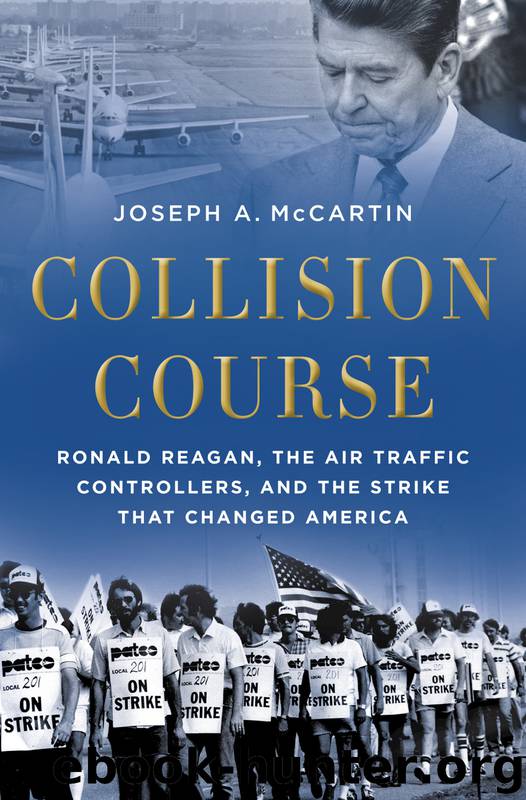Collision Course by McCartin Joseph A.;

Author:McCartin, Joseph A.; [McCartin, Joseph A.;]
Language: eng
Format: epub
ISBN: 9780199836789
Publisher: Oxford University Press
Published: 2011-01-15T07:00:00+00:00
REAGAN’S PROMISE
As his team perfected a contingency plan tight enough to defeat a national strike in 1981, one thought haunted Langhorne Bond: would President Jimmy Carter have the nerve to see it through? Carter “didn’t have a lot of sympathy with illegal strikes,” Bond knew. Still, Carter was a Democrat, and labor was a major constituency of his party. Would he feel pressured to compromise with strikers rather than let the contingency plan force them to relent? Carter’s likely reaction to a strike was the one thing Bond “couldn’t figure out.”40
PATCO had figured out Carter enough to know that his administration had been disastrous for air traffic controllers. The loss of the early retirement and immunity programs and the steady erosion of real earnings left little enthusiasm for Carter in PATCO’s ranks, even though Democrats outnumbered Republicans by a significant margin in the union. Members complained that he made federal workers “the expendable lamb at the altar of fiscal sacrifice” and argued that the treatment of federal workers was “worse under this so-called Democratic administration than it was with the Republicans.” During his presidency, Leyden had counseled patience, arguing that Carter was struggling with a poor economy and a conservative resurgence. By the time Poli took over the union, patience was gone. It did not take “a political science major to figure out where the present administration is coming from and where it is headed,” noted Gary Eads. Under Carter, Eads predicted, federal employees would be “hit quicker, more decisively, and harder than any other segment of our society.”41
PATCO was scarcely alone in its disenchantment. Across the labor movement, leaders were furious with Carter for a long list of failures and broken promises. Carter promised to support labor law reform, then he sabotaged its chances by insisting that the Senate first deal with the controversial Panama Canal treaty. By the time the bloodied Democratic majority ratified the treaty it lacked the cohesion to overcome a Republicanled filibuster of the labor bill. Carter promised Hatch Act reform, which would loosen restrictions on federal workers’ ability to engage in political activity, and then stood by idly while the reform bill died in committee. He promised a robust economic stimulus, yet delivered measures that the AFL-CIO found anemic. He promised to place federal workers’ rights on statutory footing, and then opted for a restrictive approach to federal union rights.42
But it was public employee unions like PATCO that were most disappointed with Carter. Jerry Wurf, leader of the largest public sector union, AFSCME, had been among Carter’s first labor backers in 1976. By 1979, Wurf had given up on Carter. Ken Blaylock, president of the AFGE, the largest union of federal workers, tried to warn the president that he had a labor problem. “Mr. President, you’ve made everybody out there, every employee out there mad,” he told Carter at a private political lunch, “you’re pissing off every federal worker out there.” Unless something changed, Blaylock warned, Carter would lose the federal workers’ vote. Blaylock
Download
This site does not store any files on its server. We only index and link to content provided by other sites. Please contact the content providers to delete copyright contents if any and email us, we'll remove relevant links or contents immediately.
| Airport | Commercial |
| Helicopters | History |
| Pictorial | Piloting & Flight Instruction |
| Repair & Maintenance |
Small Unmanned Fixed-wing Aircraft Design by Andrew J. Keane Andras Sobester James P. Scanlan & András Sóbester & James P. Scanlan(32137)
Navigation and Map Reading by K Andrew(4550)
Endurance: Shackleton's Incredible Voyage by Alfred Lansing(3834)
Wild Ride by Adam Lashinsky(1655)
And the Band Played On by Randy Shilts(1612)
The Box by Marc Levinson(1591)
Top 10 Prague (EYEWITNESS TOP 10 TRAVEL GUIDES) by DK(1563)
The Race for Hitler's X-Planes: Britain's 1945 Mission to Capture Secret Luftwaffe Technology by John Christopher(1523)
The One Percenter Encyclopedia by Bill Hayes(1461)
Girls Auto Clinic Glove Box Guide by Patrice Banks(1357)
Trans-Siberian Railway by Lonely Planet(1337)
Looking for a Ship by John McPhee(1316)
Fighting Hitler's Jets: The Extraordinary Story of the American Airmen Who Beat the Luftwaffe and Defeated Nazi Germany by Robert F. Dorr(1299)
Batavia's Graveyard by Mike Dash(1298)
Troubleshooting and Repair of Diesel Engines by Paul Dempsey(1280)
Bligh by Rob Mundle(1269)
TWA 800 by Jack Cashill(1249)
The Great Halifax Explosion by John U. Bacon(1227)
Ticket to Ride by Tom Chesshyre(1224)
